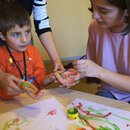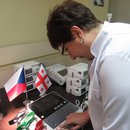Vaccination remains one of the most effective public health tools in human history. According to the World Health Organization (WHO), over the past 50 years, vaccination has saved more than 154 million lives. The absolute majority of those were children under the age of five. Without vaccination, diseases such as measles, rubella, and mumps — which are still considered among the most serious and life-threatening infections — would claim millions of lives each year.
Timely immunization means the development of herd immunity
Many infectious diseases, including measles, polio, and diphtheria, have no specific treatment – only supportive therapy is available. Therefore, in such cases, vaccination is not just prevention but the only means of protection.
Timely vaccination of children is not just an individual choice — it is a strong cornerstone of public health. Timely immunization creates so-called herd immunity, which protects not only those who are vaccinated but also those who cannot be vaccinated due to health conditions.
In Georgia, the national immunization programme provides free protection for children against 13 vaccine-preventable diseases, based on the schedule of prophylactic vaccinations. Unfortunately, due to a lack of information and often fear or distrust of vaccines, many children remain outside the vaccination process due to decisions made by their parents, putting the children's lives at risk.
In recent years, significant progress has been made in the development of the immunization programmme. However, the coverage rate of routine immunization remains problematic at all levels. The COVID-19 pandemic has significantly disrupted the vaccination process and deepened public distrust, which has resulted in an increase in the number of children with zero-dose and incomplete vaccinations. This poses a serious challenge to public health.
Caritas Czech Republic, with support from the Government of Korea and UNICEF, is implementing a project focused on strengthening immunization equity and demand, particularly in three municipalities facing challenges: Rustavi, Gori, and Marneuli.
Barriers that prevent parents from vaccinating their children
The results of the research conducted within the project reveal that barriers faced by parents prevent them from involving their children in the vaccination process. For some, these barriers are exaggerated concerns about contraindications or misinformation found online; for others, incomplete information from doctors, including about the vaccination schedule and the importance of the second dose.
According to the research, in the case of Rustavi, the proportion of children with zero vaccine doses increased to 20% in 2023 alone — one of the highest rates in the country. Concerns from caregivers about starting vaccinations at an early age and fear of possible side effects, especially in cases of mild infections, often lead to delays in vaccination. This is often driven by disinformation obtained from social media, where negative discussions about vaccines — including the human papillomavirus (HPV) vaccine — are common.

In the case of Gori, caregivers often delay vaccinating their children due to temporary health conditions, even though such cases are not considered contraindications. Furthermore, they often lack sufficient information about the benefits of vaccination and how to manage side effects. Medical personnel frequently lack access to target indicators and epidemiological data, which clearly hinders effective monitoring.
In the case of Marneuli, one of the obstacles is the language barrier. This limits both the doctor’s ability to fully understand immunization guidelines and the parents’ access to understandable and culturally appropriate information. Moreover, there is an established practice of prescribing preventive medications before vaccination, which also delays the process. Another identified issue is unequal patient registration and the negative attitude of community influencers toward vaccination.
It is worth noting that in villages, electricity and internet shortages are common, which limit timely data entry into electronic databases and hinder the smooth functioning of the service.
Why vaccination is a unique opportunity for every child
Ivane Chkhaidze, Medical Director of Iashvili Central Children’s Hospital, says that vaccination is a unique opportunity to prevent children from getting 13 severe, life-threatening diseases from the outset. Moreover, starting vaccination during infancy, when the child’s immune system is very weak, is an extremely important step in each child's life:
“It’s natural for new parents to feel anxious — it’s part of caring. Many say they won’t vaccinate their child because they have a runny nose or a cough, which is, of course, the wrong approach. The only true contraindication for vaccination is an acute illness with high fever on the day of or the day before vaccination. On the internet, especially on social media, false information is often spread suggesting that vaccines are dangerous. However, numerous studies conducted in the world’s leading countries have unequivocally confirmed that vaccines are safe.
Vaccination begins on the very first day of life, in the maternity hospital. Afterwards, the responsibility shifts to the parent and the family doctor. The first outpatient vaccination is required at the age of two months. The earlier the child is vaccinated, the better they are protected from life-threatening diseases and their possible complications. A child's natural immunity absolutely needs to be strengthened — and that’s exactly why vaccination is necessary.”
Timely vaccination protects your child from life-threatening diseases!
To schedule a visit, contact your family doctor or call: 1505 or 116 001
Routine vaccination is free nationwide!
This article was prepared within the framework of the project "Responding to the Decline in Vaccination Rates in Rustavi, Marneuli, and Gori", supported by the Republic of Korea and UNICEF, and is carried out by Caritas Czech Republic. The project, which runs from April to December 2025, seeks to strengthen the capacity of primary healthcare facilities and maternity hospitals in the three target municipalities. Through technical assistance, training, and system improvements, the initiative will help ensure that more children receive life-saving vaccines on time and in a safe, trusted environment.








